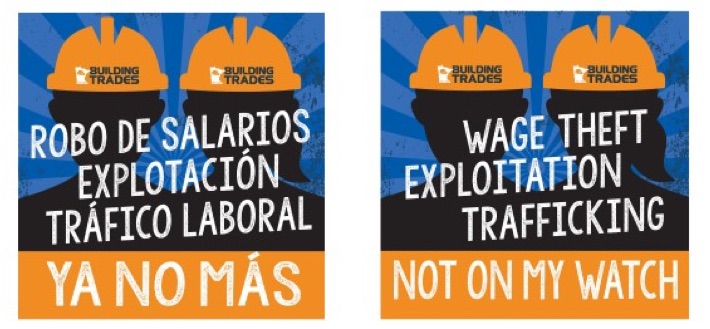

Share
Leaders of 14 unions that represent Minnesota’s unionized construction workforce Thursday announced the launch of a new initiative to combat wage theft, exploitation, and labor trafficking, which they say pose a growing threat to the welfare of immigrant workers and the health of the state’s construction industry.
The Not On My Watch campaign will enlist union staff and rank-and-file members in efforts to identify cases of abuse, and to assist exploited construction workers. Union construction workers will be asked to wear hard-hat stickers that read “Not On My Watch” or “Ya No Mas” and participate in job-site actions to show solidarity with immigrant construction workers who may be vulnerable to exploitation by unscrupulous contractors.
“This initiative is about ensuring that no construction workers in our state are exploited and that all contractors are held accountable to the law,” said Jessica Looman, Executive Director of the Minnesota State Building and Construction Trades Council, “In Minnesota, workers stand-up for workers.”
Union members and nonunion workers joined forces last month at a rally to protest allegations of wage theft by immigrant concrete workers building the Digi-Key Expansion Project in Thief River Falls, Minnesota that was widely covered on TV and in print. A second major rally is planned for downtown Minneapolis on Monday, July 29, immediately before a Minneapolis City Council hearing on a proposed wage theft ordinance.
Minnesota Building Trades leaders were joined at the unveiling of their wage theft initiative by Attorney General Keith Ellison welcomed the announcement.
“Wage theft is theft, pure and simple. Not only does it rob workers of their ability to afford their lives, it robs them of their dignity,” Attorney General Ellison said. “It’s also often the canary in the coal mine for other serious abuses, like denial of healthcare and human trafficking, which we’ve seen right here in Minnesota. I’m proud that our new law against wage theft is the strongest in the country, but we in government can’t fight it alone. That’s why I’m grateful for the ‘Not On My Watch’ and ‘Ya No Más’ campaigns. It’s powerful that workers themselves will be on the front lines in helping us fight wage theft and helping all workers afford their lives and live with dignity and respect.”
Nancy Leppink, Commissioner of the Minnesota Department of Labor and Industry also welcomed the announcement. “The State of Minnesota is committed to combating wage theft, but we can’t do it alone,” said Commissioner Leppink. “We will need the help of labor, community leaders, responsible employers, and of course workers themselves, to make sure workers know their rights and can bring abuses to light.”
Leaders of regional building trades councils emphasized that wage theft and worker exploitation are problems in every corner of the state. “A lot of people think wage theft is a big city problem, but it’s everywhere,” according to Northwest Minnesota Building Trades President Darrell Lende.
Nate O’Reilly, President of the Southeastern Minnesota Building Trades Council, observed that wage theft and exploitation have become a major problem in the booming Rochester building market.
“The building boom in Rochester has created a lot of good family-supporting jobs for members, but it has also attracted shady contractors who are trying to make a quick buck off the backs of immigrant workers. Our members see it every day.”
Dan McConnell, Business Manager of the Minneapolis Building and Construction Trades Council says the severity of the crisis in the Twin Cities construction market became clear when alleged “labor broker” Ricardo Batres was arrested and charged with labor trafficking.
“We knew it was bad, but we didn’t know how bad until local groups like Centro de Trabajadores Unidos en la Lucha (CTUL) started persuading workers to come forward with their stories.”

McConnell explained that the goal of his council’s upcoming rally in downtown Minneapolis is to educate union members while putting area developers and contractors on notice.
“We want to make sure the message to developers is loud and clear,” according to McConnell. “We won’t look the other way, and if we catch you using exploited or trafficked labor on your construction projects, we’re going to take action.”

